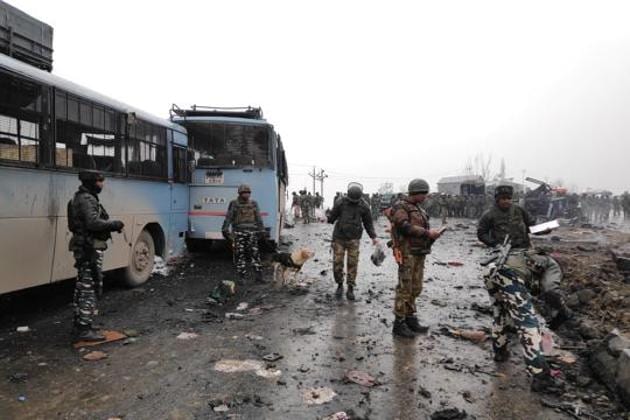Unless Pakistan radically reforms itself, it will join the rogue states club
Pakistan army’s statement indicates that Rawalpindi has again chosen to take the total deniability route in the Pulwama attack as it did in the past with Uri, Pathankot, 26/11 and the Parliament attack
Diametrically opposite statements in the span of five days by Pakistan’s foreign minister Makdoom Shah Mehmood Qureshi and Rawalpindi GHQ’s resident spinmaster major general Asif Ghafoor on the existence of Jaish-e-Mohammed terrorist group and its leadership in Pakistan is singularly instructive on many counts.

First, by overruling the minister in denying the existence of JeM in Pakistan, Ghafoor has made it clear, yet again, that it is the Pakistani army that calls all the shots in the Islamic Republic. Qureshi must be having a feeling of déjà vu as he was blindsided by the same army-terrorist network when he was found clueless in New Delhi during the 26/11 attacks. It was then Pakistan army chief Ashfaq Kayani who sent his personal aircraft to pick up a stranded Qureshi from New Delhi.
The then Pakistan national security advisor Mehmood Durrani lost his job post 26/11 after he admitted that Ajmal Kasab was a Pakistani national.
Second, the comments suggest that Islamabad will once again try to use the China card to veto a move to get JeM chief Masood Azhar listed as a global terrorist on March 13 when the proposal comes up for listing under the United Nations’ 1267 resolution. China, to date, has maintained silence over its intention at the UN. This is despite the fact that the United States is using all the resources at its command to help India nail the JeM’s role in Pulwama bombing and get Azhar and his terror factory listed by the United Nations Security Council (UNSC).
Third, Pakistan, which selectively uses UNSC resolution 47 to harp about its demand for a plebiscite in Kashmir despite not even adhering to the first condition of withdrawing from Pakistan-occupied Kashmir, chooses to blatantly ignore the October 2001 listing of JeM as terrorist group according to the 1267 listing.
The importance of Masood Azhar to Pakistan is evident from the fact that Islamabad wrote up a note verbale to India to release him from custody after he was arrested in Srinagar in 1994. A mere 26-years-old at that time, Azhar was already the chief ideologue of the now defunct Harkat-ul-Ansar terrorist group and was used for showing the path of Askari jihad to the Taliban through their common Deobandi ideology.
Fourth, Ghafoor’s statement indicates that Rawalpindi has again chosen to take the total deniability route in the Pulwama attack as it did in the past with Uri, Pathankot, 26/11 and the Parliament attack. No amount of evidence from India or the international community will make it budge from that position. Both JeM and its comrade-in-arms Lashkar-e-Tayebba (LeT) are strategic arms of Rawalpindi GHQ, used with effect to degrade Indian capabilities and capacities. They also help China by keeping India destabilised.
Fifth, by using US manufactured F-16 fighters in the February 27 attack on India and placing highly versatile M-4 sub-machine guns in the hands of jihadists, Pakistan has made it clear that it will provide military grade weapons to terrorists and use the platforms procured in the name of war on terror in Afghanistan against India by throwing the rule book out of the window. Remember, it was Rawalpindi that placed the Stinger missile in hands of terrorists targeting in the late 1980s and early 1990s by diverting them from the Afghan mujahideen.
The Pulwama bomber has been photographed with a M-4 rifle; the same weapon was recovered from Masood Azhar’s relative in 2018; a Stinger missile was used against Squadron leader Ajay Ahuja by terrorists in the 1999 Kargil war; and the Austrian Arges high explosive grenades was used in the 2001 attack on Parliament.
Sixth, the arrest of 44 members of proscribed organisations by Pakistan on February 5 is part of the charade to assuage the international community as similar actions have been followed after every major terrorist attack against India. Indian diplomats briefing their counterparts on the Pulwama attack and JeM’s involvement have communicated the same to them.
Things are different this time as new red lines have been drawn by India and the international community particularly the US. No longer will an Indian air chief be an odd man out as Fali Homi Major was after he recommended an air-strike to then prime minister Manmohan Singh after 26/11. PM Narendra Modi has made it amply clear that each terrorist strike will be accounted for and met with a counterstrike. The other big change is the attitude of the US and the international community. The Trump administration is going out of its way not only to nail the JeM’s role in Pulwama by supporting the Indian investigation but has also been unambiguous in supporting India’s right to self defence. Whether it is Sunni Saudi Arabia and UAE or Shia Iran, there is support for India with Tehran bristling to retaliate against Pakistan for the killing of 27 Revolutionary Guards in a suicide car bombing a day before the Pulwama attack. Unless Pakistan radically reforms itself, it will soon join the club of rogue states which includes North Korea, and with the same mentor.
shishir.gupta@hindustantimes.com




